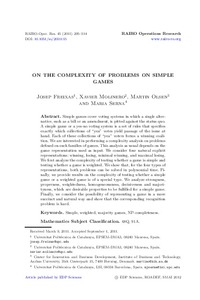Mostra el registre d'ítem simple
On the complexity of problems on simple games
| dc.contributor.author | Freixas Bosch, Josep |
| dc.contributor.author | Molinero Albareda, Xavier |
| dc.contributor.author | Olsen, Martin |
| dc.contributor.author | Serna Iglesias, María José |
| dc.contributor.other | Universitat Politècnica de Catalunya. Departament de Matemàtica Aplicada III |
| dc.contributor.other | Universitat Politècnica de Catalunya. Departament de Ciències de la Computació |
| dc.date.accessioned | 2014-12-18T19:12:37Z |
| dc.date.available | 2014-12-18T19:12:37Z |
| dc.date.created | 2011-10 |
| dc.date.issued | 2011-10 |
| dc.identifier.citation | Freixas, J. [et al.]. On the complexity of problems on simple games. "RAIRO. Operations research", Octubre 2011, p. 295-314. |
| dc.identifier.issn | 0399-0559 |
| dc.identifier.uri | http://hdl.handle.net/2117/25093 |
| dc.description | The original publication is available at www.rairo-ro.org |
| dc.description.abstract | Simple games cover voting systems in which a single alter- native, such as a bill or an amendment, is pitted against the status quo. A simple game or a yes-no voting system is a set of rules that specifies exactly which collections of “yea” votes yield passage of the issue at hand. Each of these collections of “yea” voters forms a winning coalition. We are interested in performing a complexity analysis on problems defined on such families of games. This analysis as usual depends on the game representation used as input. We consider four natural explicit representations: winning, losing, minimal winning, and maximal losing. We first analyze the complexity of testing whether a game is simple and testing whether a game is weighted. We show that, for the four types of representations, both problems can be solved in polynomial time. Finally, we provide results on the complexity of testing whether a simple game or a weighted game is of a special type. We analyze strongness, properness, weightedness, homogeneousness, decisiveness and majorityness, which are desirable properties to be fulfilled for a simple game. Finally, we consider the possibility of representing a game in a more succinct and natural way and show that the corresponding recognition problem is hard. |
| dc.format.extent | 20 p. |
| dc.language.iso | eng |
| dc.subject | Àrees temàtiques de la UPC::Matemàtiques i estadística::Investigació operativa::Teoria de jocs |
| dc.subject.lcsh | Voting--Mathematical models |
| dc.subject.lcsh | Game theory |
| dc.subject.other | Simple |
| dc.subject.other | Weighted |
| dc.subject.other | Majority games |
| dc.subject.other | NP-completeness |
| dc.title | On the complexity of problems on simple games |
| dc.type | Article |
| dc.subject.lemac | Vot -- Models matemàtics |
| dc.subject.lemac | Jocs, Teoria de |
| dc.contributor.group | Universitat Politècnica de Catalunya. GRTJ - Grup de Recerca en Teoria de Jocs |
| dc.contributor.group | Universitat Politècnica de Catalunya. ALBCOM - Algorismia, Bioinformàtica, Complexitat i Mètodes Formals |
| dc.identifier.doi | 10.1051/ro/2011115 |
| dc.description.peerreviewed | Peer Reviewed |
| dc.subject.ams | Classificació AMS::91 Game theory, economics, social and behavioral sciences::91A Game theory |
| dc.rights.access | Open Access |
| local.identifier.drac | 9431557 |
| dc.description.version | Postprint (published version) |
| local.citation.author | Freixas, J.; Molinero, X.; Olsen, M.; Serna, M. |
| local.citation.publicationName | RAIRO. Operations research |
| local.citation.startingPage | 295 |
| local.citation.endingPage | 314 |
Fitxers d'aquest items
Aquest ítem apareix a les col·leccions següents
-
Articles de revista [1.049]
-
Articles de revista [3.269]
-
Articles de revista [274]
-
Articles de revista [110]


